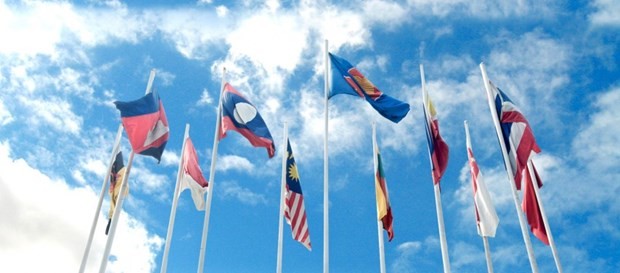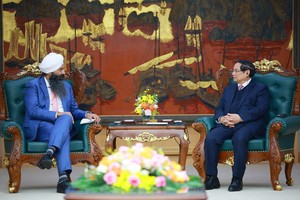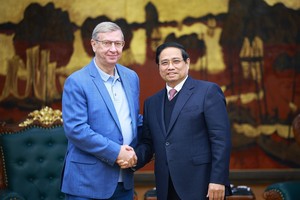
The following is the Press Statement by the Chairman of the ASEAN Foreign Ministers’ Retreat.
1. The ASEAN Foreign Ministers’ Retreat was convened on January 16-17, 2020 in Nha Trang. The Retreat is the first gathering of the ASEAN Foreign Ministers in 2020 under the theme “Cohesive and Responsive ASEAN”.
2. We had in-depth discussions on ASEAN’s priorities for the year 2020 and the way forward for the ASEAN Community building, strengthening of ASEAN’s external relations and reinforcement of ASEAN-centered regional architecture. We also exchanged views on regional and international developments as well as how ASEAN can effectively respond to challenges and opportunities arising from the regional and international dynamics while being able to maintain unity, cohesiveness and centrality in the interest of peace, security, stability, prosperity and sustainability in the region and beyond. In this regard, we also reaffirmed ASEAN’s strong commitment to open regionalism and multilateralism.
3. We reaffirmed our shared commitments to maintaining and promoting peace, security and stability in the region, as well as to the peaceful resolution of disputes, including full respect for legal and diplomatic processes, without resorting to the threat or use of force, in accordance with the universally recognized principles of international law, including the 1982 United Nations Convention on the Law of the Sea (UNCLOS).
4. ASEAN Foreign Ministers expressed support for Vietnam’s main priorities and proposed key deliverables under the theme “Cohesive and Responsive ASEAN” in 2020, which are in line with the consistent goals of ASEAN Community building and in continuity with the ongoing efforts of the previous ASEAN Chairs. The Ministers stressed the importance of strengthening ASEAN unity, cohesiveness, deepening ASEAN economic integration, enhancing intra-ASEAN trade and investment, promoting sustainable development, and enhancing connectivity and sub-regional cooperation, including the Mekong sub-regional development, and promoting a prominent image and visibility of the ASEAN Community while being pro-active in response to unfolding opportunities and challenges from the fast-changing regional and global landscapes as well as the swift development of technology in the advent of the Fourth Industrial Revolution (4IR). The Ministers looked forward to the outcomes of the mid-term review of the ASEAN Community Vision 2025 Blueprints in 2020 and agreed to take a forward-looking approach by initiating discussions on the ASEAN vision beyond 2025. The Ministers also agreed to enhance environment protection and cooperation, particularly on climate change, marine debris, and transboundary haze pollution, as well as in the areas of sustainable development, women empowerment and gender equality.
5. We agreed to follow-up on the discussions of Leaders during the 34th and 35th ASEAN Summits including, among others, enhancing existing partnerships and exploring new ones with a view to share the region’s outlook based on mutual respect and benefit; optimising the use of the ASEAN Secretariat new building for efficiency of the conduct of ASEAN activities; and better preparing the ASEAN Community to face existing and forthcoming challenges such as natural disasters by diversifying sources of funding.
6. We reaffirmed the importance and relevance of the Treaty of Amity and Cooperation in Southeast Asia (TAC) as the key code of conduct governing inter-state relations in the region and a foundation for maintaining regional peace and stability. We are committed to further promoting the purposes and principles of the TAC. We welcomed the growing interests of non-regional countries to accede to the TAC on the basis of respect for and in conformity with the purposes and principles of the TAC and agreed to consider new applications in accordance with the Revised Guidelines for Accession to the TAC.
7. We reaffirmed the importance of the ASEAN Outlook on the Indo-Pacific (AOIP) as a guide for ASEAN’s engagement with the wider Asia-Pacific and Indian Oceans. We agreed to continue promoting further the purposes and principles contained in the Outlook, as well as encouraging external partners to support and undertake pratical cooperation with ASEAN in four key areas of cooperation, namely maritime, connectivity, sustainable development and economic cooperation.
8. We noted the successful conduct of the APSC Fact-Finding Mission (FFM) to Timor-Leste on September 3-5, 2019 and looked forward to the Fact-Finding Missions of the AEC and ASCC to Timor-Leste, which would contribute to the consideration of Timor-Leste’s application for ASEAN membership. We reaffirmed our commitments to support Timor-Leste through capacity building assistance at the bilateral and regional levels.
9. We noted the on-going preparations for the ASEAN-New Zealand Leaders’ Summit in commemoration of the 45th Anniversary of the ASEAN-New Zealand Dialogue Relations, which shall be held on April 9, 2020 in Da Nang, Vietnam after the conclusion of the 36th ASEAN Summit. In this regard, we supported the proposal for adoption of a Joint Vision Statement by the Leaders of ASEAN and New Zealand as an outcome document of the Summit.
10. We discussed the ASEAN-US relations and agreed that frequent high-level engagements between the Leaders would be of crucial importance. We welcomed the invitation by President of the US to convene a Special Summit to commemorate the 5th Anniversary of ASEAN-US Strategic Partnership this year and would report this to the Leaders for final decision. We also looked forward to welcoming the US President to the ASEAN related Summits this November in Hanoi.
11. We emphasized the significance of the year 2020 to the ASEAN-UN comprehensive partnership as it marks the 75th Anniversary of the UN, during which Indonesia and Vietnam are elected non-permanent members of the United Nations Security Council in 2020. We supported the proposal of Vietnam as the President of the United Nations Security Council (UNSC) in January 2020 to hold a Briefing by ASEAN at the UNSC on the topic of “Cooperation between the UN and regional and sub-regional organizations in maintaining international peace and security: The Role of ASEAN”, in January 2020 in New York.
12. We noted France’s application for the status of ASEAN Development Partner. We agreed to task the Secretary-General of ASEAN to conduct an assessment of the application, and make recommendations in due course.
13. We reaffirmed the need for ASEAN to be more visible and to play an enhanced role in supporting Myanmar through providing humanitarian assistance, facilitating the repatriation process, and promoting sustainable development in Rakhine State. We noted the progress and appreciated the efforts of the Secretary-General of ASEAN in leading the implementation of the recommendations of the ASEAN-Emergency Response and Assessment Team (ERAT) Preliminary Needs Assessment (PNA) to facilitate the repatriation of displaced persons in Rakhine State. We noted the establishment of an Ad-hoc Support Team (AHAST) of the ASEAN Secretariat to focus on supporting the implementation of the recommendations of the PNA and look forward to the conduct of the Comprehensive Needs Assessment (CNA). We tasked AHAST to identify further concrete projects through which ASEAN could help improve the ground conditions in Rakhine State. We encouraged the continued dialogue between Myanmar and Bangladesh to facilitate the repatriation process of displaced persons from Rakhine State. We welcomed the second visit of High-Level Mission from Myanmar together with representatives from the ASEAN Secretariat and the AHA Centre, including ASEAN-ERAT members to Cox’s Bazar, Bangladesh, from December 18-19, 2019 to share the information on arrangements made by Myanmar for prospective returnees. We recalled the Arrangement on Return of Displaced Persons from Rakhine State between Myanmar and Bangladesh signed in 2017 and looked forward to the voluntary return of displaced persons in a safe, secure and dignified manner. We reiterated the need to find a comprehensive and durable solution to address the root cause of the conflict and to create a conducive environment so that the affected communities can rebuild their lives. We also reaffirmed ASEAN’s continued support for Myanmar’s efforts to bring peace, stability and the rule of law, to promote harmony and reconciliation among the various communities as well as to ensure sustainable and equitable development in Rakhine State.
14. We reaffirmed the importance of maintaining and promoting peace, security, stability, safety and freedom of navigation in and overflight above the South China Sea and recognised the benefits of having the South China Sea as a sea of peace, stability and prosperity. We underscored the importance of the full and effective implementation of the 2002 Declaration on the Conduct of Parties in the South China Sea (DOC) in its entirety. We were encouraged by the progress of the substantive negotiations towards the early conclusion of an effective and substantive Code of Conduct in the South China Sea (COC) that is consistent with international law, including the 1982 UNCLOS. We emphasised the need to maintain and promote an environment conducive to the COC negotiations, and thus welcomed practical measures that could reduce tensions and the risk of accidents, misunderstandings and miscalculation. We stressed the importance of undertaking confidence building and preventive measures to enhance, among others, trust and confidence amongst parties; and we reaffirmed the importance of upholding international law, including the 1982 UNCLOS.
15. We discussed the situation in the South China Sea, during which concerns were expressed on the land reclamations, recent developments and serious incidents, which have eroded trust and confidence, increased tensions and may undermine peace, security and stability in the region. We reaffirmed the need to enhance mutual trust and confidence, exercise self-restraint in the conduct of activities and avoid actions that may further complicate the situation and pursue peaceful resolution of disputes in accordance with international law, including the 1982 UNCLOS. We reaffirmed that international law, including the 1982 UNCLOS is the basis for determining sovereignty, sovereign rights and legitimate interests over maritime areas. We further reaffirmed that the 1982 UNCLOS is the overarching framework of legal order for the seas that must be respected by all countries. We emphasised the importance of non-militarisation and self-restraint in the conduct of all activities by claimants and all other states, including those mentioned in the DOC that could further complicate the situation and escalate tensions in the South China Sea.
16. We stressed the importance of continued peaceful dialogue amongst all concerned parties towards lasting peace and stability in a denuclearised Korean Peninsula. To this end, we urged all concerned parties to resume peaceful dialogue and continue working constructively, including through the full and expeditious implementation of the Panmunjom Declaration, the Pyongyang Joint Declaration and the Joint Statement by the US and DPRK Leaders. We reiterated our commitment to the full implementation of all relevant United Nations Security Council Resolutions and noted international efforts to bring about the complete, verifiable and irreversible denuclearisation of the Korean Peninsula. We also underscored the importance of ASEAN-led platforms such as the ASEAN Regional Forum (ARF) in promoting a conducive atmosphere for dialogue amongst the concerned parties.
17. We remained concerned over the situation in the Middle East and reiterated our call on all parties concerned to exercise self-restraint and avoid acts that may aggravate the situation and to resolve differences through diplomacy and dialogue in the interest of maintaining peace and stability in the region.
18. We stressed the importance of intensifying regional efforts and cooperation in tackling non-traditional security challenges such as terrorism and violent extremism, transnational crimes, maritime security, cyber threat and water security.
19. We welcomed Singapore’s nomination of Mr. Daren Tang, Chief Executive of Intellectual Property Office of Singapore (IPOS), as the candidate from ASEAN for the position of Director-General of the World Intellectual Property Organisation.
























